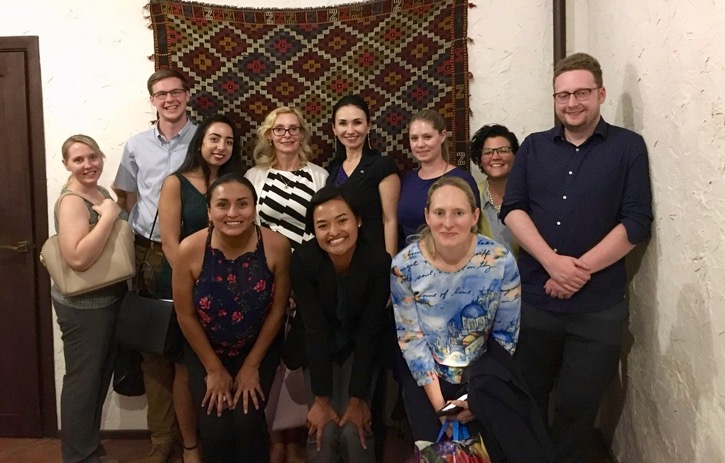
In August 2018, S-CAR students traveled with Professor Karina Korostelina [back row, fourth from left] to Ukraine to learn about social cohesion and national resilience. (Photo credit: Jenny Smith [back row, second from right])
By Nora Malatinszky
Sometimes to truly appreciate a place, you must leave it and come back to fall in love with it all over again.
For Jenny Smith, a master’s student at the School for Conflict Analysis and Resolution, an August 2018 course abroad gave her the opportunity to do just that by returning to Ukraine, where she lived from 1996 to 1998.
“I have always wanted to go back,” said Smith, who served as a missionary in the regions of Crimea and Kyiv. “So when I saw that it was an option as part of the S-CAR program, I decided to apply for the course.”
During the course, S-CAR students traveled to Ukraine under the guidance of Professor Karina Korostelina, who supported them in conducting interviews with academics, experts, and journalists on how the negotiation and organization of everyday activities in different cultural contexts should occur.
(In May 2019, Professor Korostelina will again lead the course abroad in Ukraine on violence, nation-building, and resilience.)
According to Professor Korostelina, the students were able to analyze “the political, social, economic, and cultural factors that contribute to violent conflict” and examine “consequences for social cohesion and national resilience in Ukraine.”
Smith said that her second experience in Ukraine “was a bit surreal” due to how different the atmosphere is today. Two decades ago, Smith saw the Ukrainian people experiencing an “enormous identity transition,” as it was just emerging as a new democracy. Today, the country is in a post-transition period.
Smith’s drive to revisit Ukraine shaped her perception and purpose with Professor Korostelina’s course, as it sparked her “interest in asking a question about Ukraine’s own experience with volunteers post-Maidan and during the current conflict.” This allowed her to see Ukrainian society in two different lights, both years before and after the protests and violent conflicts of the 2014 Euromaidan Revolution.
Thanks to her previous two-year immersive experience in Ukraine, Smith contributed a prior knowledge of the language and culture to the course abroad that Professor Korostelina found to be very supportive for other students, and it “helped Jenny address her own research question and interpret results.”
During the course abroad, Smith learned first-hand information on the dynamics of violence and furthered her academic development by learning to conduct research in a new cultural context, an experience that her fellow students also shared. Professor Korostelina said that by creating their own research questions and inquiries, the students who participated in the course “established individual ownership of their research.”
Studying abroad can be a beneficial experience for all students, Smith said, and she encouraged her peers to consider the opportunity. Exploring different areas of interest both geographically and academically helped her come out of the experience with a slew of skills that she hopes to apply in the future.
Smith says that her journey after S-CAR may take her down the path of diversity and inclusion in workplaces and communities, or using dialogue and conflict resolution tools with elementary-school-age children. She said that her study abroad experience will help her “apply concepts and methods to real-world conflicts.”
Smith especially highlighted the impact that her peers had on her learning experience. “The course and trip were also an invaluable lesson on the sheer depth and value of my classmates,” she said. “I learned something new from each of them and will forever be grateful for the friendships gained on the trip.”
